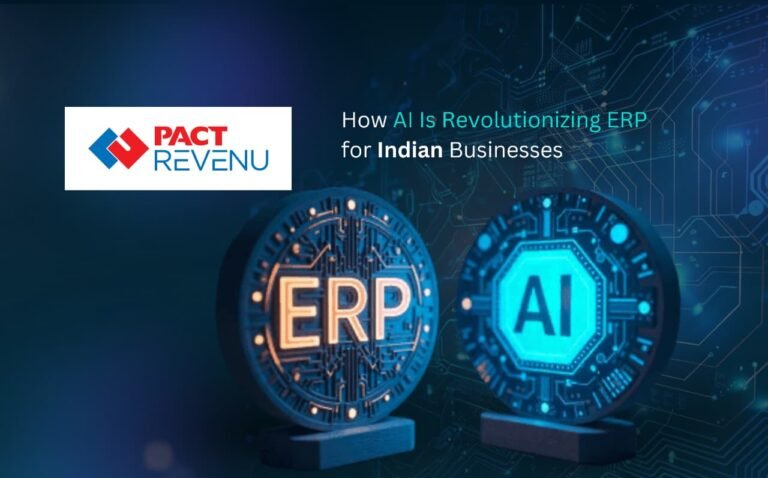Understanding ERP: The Backbone of Modern Business
What is ERP, and why do I need it? If that is what you are looking for, then you are on the right page.
Based in India's thriving economic hub, where traditional ways blend with modern technology, there is a powerful tool that is revolutionizing the manner in which companies conduct business: Enterprise Resource Planning (ERP) systems. No longer do firms operate at a snail's pace since they were compelled to use massive, paper accounting books and complex spreadsheets.
Today, ERP is the technological foundation of modern companies, coupling disparate functions—anything from human resources and finance to supply chains and customer relationships—into a streamlined system.
But why are ERP systems so vital to the Indian market? And how are they solving the unique problems of doing business here? Let's move closer to ERP implementation, progressing further.
We'll look at how it can truly help Indian enterprises by solving problems and solving their unique problems.
Whether you are a Mumbai multinational factory or a Bangalore startup, ERP expertise is no longer optional; it is a strategic necessity.
Come with us as we uncover the hidden layers of ERP systems, learn how they affect everyday business processes, and find the new technologies that will change the business processes at their center.
Why would companies require ERP?
ERP systems are the central nervous systems of businesses today. They allow businesses to run more effectively, make smarter decisions, and grow more quickly.
Efficiency Boost: ERP systems automate and mechanize many business activities, from accounting through supply chain management, reducing the need for human labor and limiting the margin for human error. Think of a factory where every machine is aware of what parts it needs and when. That is ERP in action. It makes tasks like ordering materials, scheduling manufacturing, and tracking inventory easier. It translates into less paper, fewer mistakes, and more time for people to engage in creative work.
True Information: ERP systems put everyone on the same page. Operations, sales, and finance can all see the same data. This avoids errors and conflict. For instance, a seller who embraces an ERP will be in a position to confirm that the products on the site are identical to the products in the stockroom, thus avoiding order fulfillment challenges. The integration also ensures that the accounting department will automatically be aware of the revenue effect with the completion of sales, leading to real-time financial reporting and quick reaction in strategy.
Growth Engine: Companies grow and mature. ERP solutions evolve smoothly. If you are opening a new store or a new product, ERP can manage the higher workload. It is similar to having a multi-skilled assistant that grows with your business. For instance, a new company can utilize ERP to manage its higher growth without suffering from the higher workload. This maintains efficiency and responsiveness as the company grows.
Smart Decisions: ERP software consolidates information from all business departments and becomes a powerful tool for strategic planning. Trends are easily seen from such information, problems can be forecasted, and opportunities are readily found.
Picture a business crystal ball. For example, a restaurant chain would use ERP data to know their best-selling products, total employees, and customer demand so that they would know how to serve the customers in an effective and efficient manner. In short, ERP helps businesses run like well-oiled machines, make smart decisions, and achieve their objectives.
Benefits of ERP
An ERP system has numerous benefits that can really help a business to improve its performance and efficiency.
Integrated Information: ERP is a single repository of all the business data. ERP integrates data from various systems and departments, ending the data silos that impede business processes. For example, when sales, finance, and inventory professionals are all looking at the same real-time information, gaps are eliminated and decision-making is significantly improved. Through this holistic data strategy, processes are streamlined and overall business effectiveness is improved.
Cost Reduction: With the elimination of redundant work, reduction of data entry, and optimization of resource usage, ERP systems enable organizations to achieve substantial cost savings. For instance, effective inventory management can minimize stockouts and overstocking, thus saving on carrying costs.
Improved Reporting: ERP solutions provide advanced reporting capabilities that allow for the delivery of actionable business performance information. Decision-makers can identify trends, track KPIs, and make better decisions with the real-time information at their disposal. Additionally, financial and regulatory compliance concerns are made simpler.
Better Customer Service: ERP solutions allow firms to provide world-class customer service. With full visibility into customer interactions, sales organizations can customize their approach. Efficient order processing, accurate inventory levels, and on-time shipment status create more customer satisfaction and loyalty.
Increased Productivity: ERP systems automate routine business activities, freeing time for more important things. The employees can focus on value-added activities, and the outcome is increased productivity and job satisfaction. For example, automated approval processes can speed up decision-making and also eliminate delays.
Better Decision Making: Real-time information and sophisticated analytics in ERP systems form the basis for decision-making. With pattern identification, outcome prediction, and performance tracking, companies can streamline operations, make informed resource allocation decisions, and attain strategic objectives.
Better Supply Chain Management: ERP software gives visibility across the supply chain, from purchase to distribution. This enables companies to control the right levels of inventory, reduce lead times, and improve coordination with suppliers. In this manner, it can lead to cost savings, improved customer satisfaction, and fewer chances of stockout or overstock.
Risk Management: ERP systems can recognize potential risks within the business. By monitoring key performance indicators and recognizing anomalies, business organizations can eliminate risks in the early stages and protect their assets.
Risk Management: ERP systems can recognize potential risks within the business. By monitoring key performance indicators and recognizing anomalies, business organizations can eliminate risks in the early stages and protect their assets.With the help of an ERP system and the full potential of its functions, businesses are able to make their operations much more sophisticated, maximize their profits, and prosper overall.
Challenges of ERP
While it has many benefits, its setup can be problematic:
- Expensive: It is extremely expensive to implement and maintain a new ERP system, especially if you have to customize it to your business
- Complexity: ERP systems are difficult to implement and consume a lot of effort to integrate into the organizational transformation
- Resistance to Change: Humans are not always fond of change, but at times, a change can be a game-changer. It can be difficult to gain everybody’s approval to try a new system and might take some time
The Future of ERP
- Cloud Computing: ERP systems are increasingly moving to the cloud, offering greater flexibility and cost savings
- Artificial Intelligence and Machine Learning: These technologies are becoming integral to ERP systems, enabling intelligent and predictive analytics
- Mobile Capability: As the workforce becomes more mobile, ERP software is evolving to be accessible from anywhere, enhancing productivity




